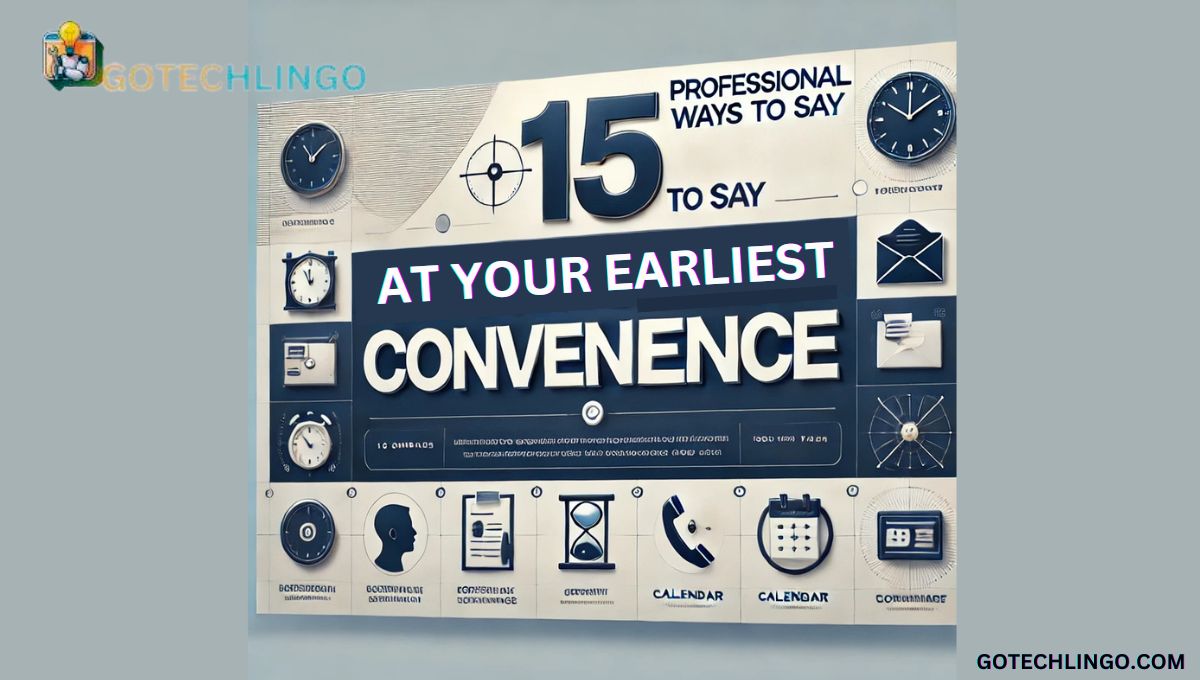In today’s fast-paced business world, how we ask for someone’s time can make all the difference.
Whether you’re drafting an email, sending a message, or making a request, finding the right words matters. Let’s explore the first seven alternatives to the somewhat outdated phrase at your earliest convenience.
Main Points
Before diving into specific alternatives, let’s understand why varying our language matters:
- Professionalism: Different phrases suit different situations
- Urgency levels: Each alternative conveys a distinct sense of timing
- Cultural considerations: Some phrases work better in certain business cultures
- Relationship dynamics: Your choice depends on who you’re addressing
Here’s a quick reference table for urgency levels:
| Phrase | Urgency Level | Formality Level |
| Promptly | High | High |
| At your convenience | Low | Medium |
| When it’s convenient | Low | Casual |
| In due course | Very Low | Formal |
Convenient Time
At a convenient time offers a polite, pressure-free way to request someone’s attention.
This phrase works brilliantly when:
- You’re communicating with senior management
- The matter isn’t urgent
- You want to show respect for the recipient’s schedule
Whenever You’re Available

This phrase strikes a perfect balance between casual and professional.
It’s particularly useful for:
- Internal team communications
- Collaborative projects
- Peer-to-peer requests
13 Funny Nicknames for Someone Who Is Always Late
Promptly
When you need to convey urgency without being pushy, “promptly” fits the bill perfectly.
Consider using this when:
- Deadlines are approaching
- Quick action is needed
- You’re communicating with clients
Best practices for using promptly:
- Provide context for the urgency
- Include specific deadlines if applicable
- Maintain a professional tone
When It’s Convenient
This phrase offers a gentle, considerate approach.
It’s particularly effective for:
- Long-term projects
- Non-urgent requests
- Building professional relationships
In Due Course
This formal phrase suggests a natural progression of events without immediate urgency.
It’s perfect for:
- Official communications
- Legal contexts
- Long-term planning
Key benefits:
- Maintains professionalism
- Acknowledges process timelines
- Shows understanding of priorities
At Your Convenience

A classic alternative that never goes out of style.
This phrase works well when:
- Writing to clients
- Communicating with senior colleagues
- Making general requests
13 Other Ways to Say “Coming Soon”
Without Delay
This phrase conveys urgency while maintaining professionalism.
Use it when:
- Time-sensitive matters arise
- Quick decisions are needed
- Clear action is required
Impact factors:
- Creates a sense of importance
- Maintains professional courtesy
- Clearly communicates timeline expectations
When It Works for You
This flexible phrase shows consideration while keeping things moving.
It’s particularly effective in:
- Remote work settings
- Cross-time zone communications
- Team collaboration scenarios
Real-world application:
- Virtual meetings scheduling
- Project timeline discussions
- International business communications
Timely Manner
When you need to emphasize efficiency without applying pressure, in a timely manner strikes the right note.
This phrase excels in:
- Contract negotiations
- Service agreements
- Professional correspondence
Consider this comparison:
| Context | Less Effective | More Effective |
| Email follow-up | “I need this ASAP” | “Please respond in a timely manner” |
| Project request | “Do this quickly” | “Complete this in a timely manner” |
| Client communication | “Hurry up” | “We appreciate your timely attention” |
As Soon As Possible (ASAP)
While common, ASAP can be refined for different situations.
Here’s how to use it effectively:
Formal version: “At your soonest possible convenience”
Semi-formal: “As soon as you’re able”
Casual: “When you get a chance”
Pick Your Time
This empowering phrase gives the recipient control while maintaining momentum.
Best used for:
- Meeting scheduling
- Project timeline discussions
- Collaborative planning
Benefits:
- Builds rapport
- Shows flexibility
- Encourages engagement
At Your Leisure
Perfect for non-urgent matters, this phrase conveys respect for the recipient’s time.
Ideal for:
- Senior management communications
- Long-term planning
- Optional requests
Usage tips:
- Add a soft deadline if needed
- Pair with context
- Include any relevant resources
When You Have a Moment
This approachable phrase works well in various professional contexts.
Consider using it when:
- Making quick requests
- Seeking brief feedback
- Following up on previous discussions
Example scenarios:
- Document reviews
- Quick consultations
- Status updates
When You’re Free
A casual yet professional alternative that’s perfect for:
- Internal team communications
- Peer-to-peer requests
- Informal business settings
Best practices:
- Include suggested time frames
- Offer multiple options
- Be specific about requirements
When You’re Ready
This patient approach works wonderfully for:
- Complex tasks requiring preparation
- Thoughtful decisions
- Strategic planning
Key considerations:
- Respects the decision-making process
- Acknowledges preparation time
- Shows understanding
Pro Tips for Professional Communication:
- Consider your audience:
- Senior management needs more formal language
- Peers can handle casual phrases
- Clients require professional courtesy
- Factor in urgency:
- High urgency: Promptly, Without delay
- Medium urgency: When you have a moment, At your convenience
- Low urgency: “At your leisure,” “In due course”
- Cultural awareness:
- Some cultures prefer direct communication
- Others appreciate more subtle approaches
- International businesses need careful phrasing
Frequently Asked Questions
Is it correct to say “at your earliest convenience”?
Yes, it’s grammatically correct but can sound outdated in modern business communication.
How do you speak professionally at your earliest convenience?
Instead say when you have a moment or at your convenience for a more modern professional tone.
What to say instead of “at your earliest convenience”?
Use when you’re available, at your convenience or when time permits for better alternatives.
Is it polite to write at your earliest convenience?
Yes, it’s polite but can sound formal or pressuring. Modern alternatives like when it suits you are often preferred.
What is a professional way to say “at your convenience”?
When it works best for you or at a time that suits your schedule are professional alternatives.
Final Thought
Mastering professional communication requires understanding both traditional and modern phrases. While at your earliest convenience has long been a staple of business correspondence, today’s workplace calls for more nuanced approaches. The key is choosing phrases that respect time boundaries while maintaining clarity and professionalism.
Rather than defaulting to at your earliest convenience, consider your relationship with the recipient and the urgency of your request. The modern workplace values authenticity and clear communication over formal pleasantries.
Whether you’re writing to colleagues, clients, or supervisors, alternatives like when you have a moment or at a time that works for you often prove more effective.
Remember, the goal isn’t just to be polite – it’s to communicate clearly and build strong professional relationships. By choosing the right phrase for each situation, you’ll enhance your professional image and improve your communication effectiveness.



